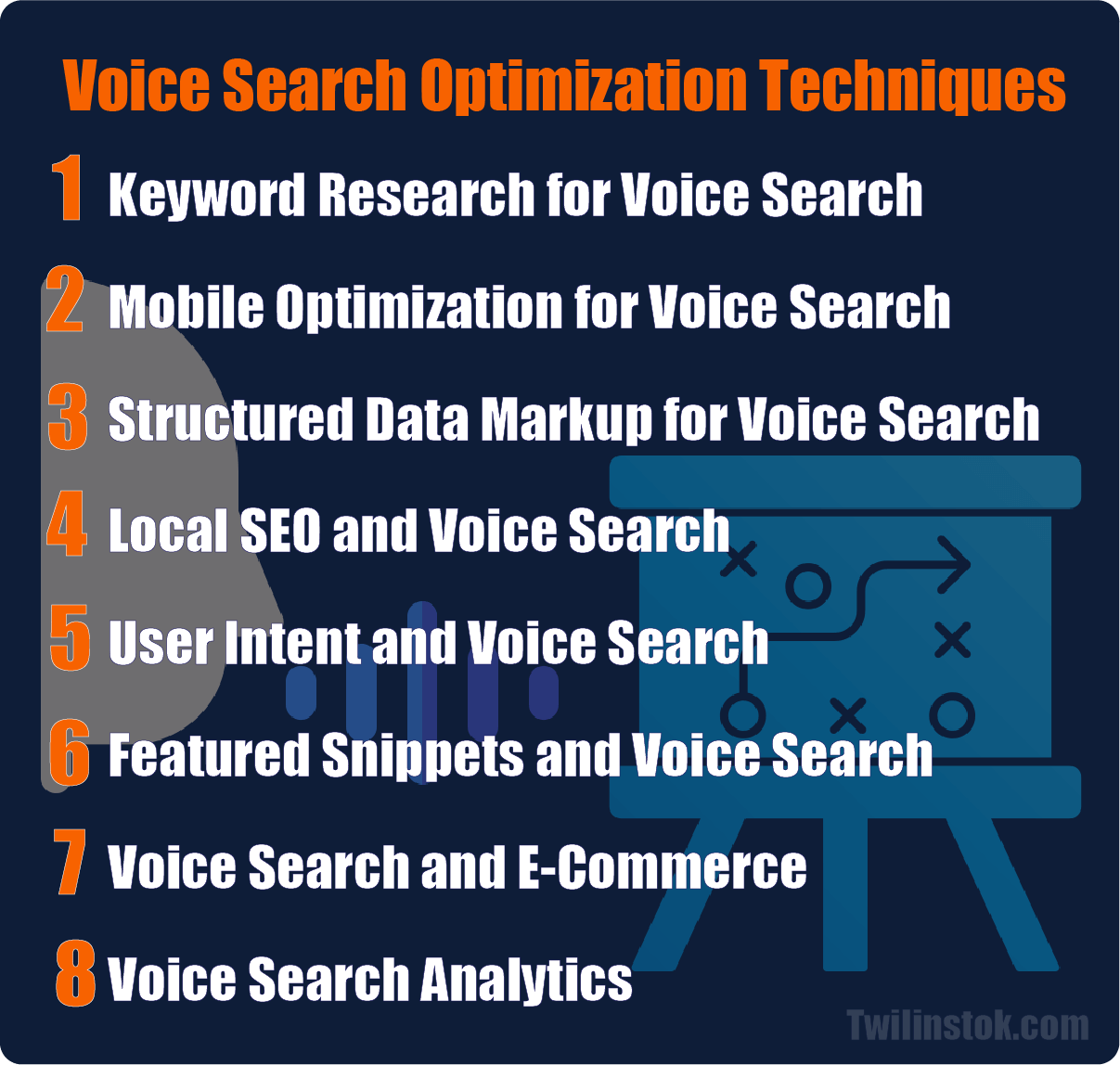In the ever-evolving landscape of digital marketing, one trend stands out prominently in years ahead – Voice Search Optimization. As voice assistants like Siri, Alexa, and Google Assistant continue to gain traction, mastering the art of Voice Search Optimization Techniques becomes not just an advantage but an essential strategy for businesses and website owners. This article from Twilinstok will serve as your guide to cracking the code in years ahead, providing valuable insights and tactics to excel in the dynamic world of Voice Search Optimization.
Understanding Voice Search
Voice search is no longer a niche feature; it has become a cornerstone of how users access information online. The concept is straightforward – instead of typing queries into a search engine, users speak their questions aloud.
The technology behind voice search has undergone remarkable advancements, thanks to Natural Language Processing (NLP) and voice recognition technology. NLP enables voice assistants to understand and interpret human language, making voice search results more conversational and context-aware. This shift in how users interact with search engines presents both challenges and opportunities for SEO professionals.
The Evolution of Voice Assistants
Voice assistants have come a long way since their inception. What began as basic voice recognition software has evolved into sophisticated virtual companions capable of performing a wide range of tasks.
This evolution is underpinned by advancements in artificial intelligence and machine learning. Siri, introduced by Apple in 2011, marked the early stages of voice assistant development. Since then, we’ve seen the emergence of Amazon’s Alexa, Google Assistant, and others. These voice assistants have moved beyond simple voice commands to engage in natural, dynamic conversations with users.

Importance of voice search optimization
The statistics and trends surrounding voice search usage underscore its growing importance. A significant number of users, especially those on mobile devices, now prefer voice search for quick and convenient information retrieval. In fact, it’s estimated that by 2024, more than half of all searches will be voice-based.
This shift in user behavior presents both challenges and opportunities for businesses. On the one hand, failing to optimize for voice search can lead to a loss of visibility and potential customers. On the other hand, those who embrace voice search optimization can gain a competitive edge and tap into a growing user base.
Voice Search Optimization Basics
To excel in voice search, you need to lay a strong foundation. This section covers the fundamental strategies, including content quality, site speed, and mobile-friendliness, that form the basis of effective voice search optimization.
Voice Search Optimization Techniques
To excel in voice search optimization, you need to lay a strong foundation. This begins with understanding the fundamental strategies that form the basis of effective voice search optimization. Content quality is paramount. Voice search often returns concise, direct answers to user queries, making high-quality content a must.
Additionally, site speed is crucial. Users expect near-instant results from voice searches, so a fast-loading website is essential.
Mobile-friendliness is another critical factor. Many voice searches occur on mobile devices, so ensuring your website is mobile-optimized is imperative.
Basic technical aspects like HTTPS security and user-friendly navigation are also essential. These fundamentals set the stage for more advanced voice search optimization strategies.
In the following, we will examine voice search optimization techniques in a more coherent way so that you can use it as a roadmap. These tactics include:
- Keyword sesearch for voice search
- Mobile optimization for voice search
- Structured data markup for voice search
- Local SEO and voice search
- User intent and voice search
- Featured snippets and voice search
- Voice search and e-commerce
- Voice search analytics
Stay with us to learn each of the above tactics well.

Keyword Research for Voice Search
Traditional keyword research methods won’t cut it in the world of voice search. Voice queries are more conversational and context-dependent, requiring a different approach to keyword optimization. Long-tail keywords that mimic natural speech patterns are essential for success. Tools like AnswerThePublic and SEMrush can help identify voice search-friendly keywords.
Additionally, understanding user intent behind voice queries is crucial. Users often pose questions to voice assistants, so optimizing for question-based keywords is a strategic move.
Mobile Optimization for Voice Search
Mobile optimization is closely tied to voice search success. Many voice searches occur on mobile devices, so ensuring your website provides an optimal experience for mobile users is non-negotiable.
Google’s Mobile-First Indexing emphasizes the importance of mobile-friendly websites. Tools like Google’s Mobile-Friendly Test can assess your site’s mobile readiness.
Elements like responsive design, fast loading times, and mobile-friendly navigation should be prioritized. Moreover, consider implementing Accelerated Mobile Pages (AMP) to enhance the mobile experience further.

Structured Data Markup for Voice Search
Structured data markup, also known as schema markup, plays a crucial role in voice search optimization. It provides search engines with additional context about your content, making it easier for them to understand and present in voice search results.
Implementing structured data can enhance your content’s appearance in featured snippets, knowledge graphs, and other rich results, which are prominent in voice search. Schema.org offers a comprehensive list of markup types that you can incorporate into your webpages.
Local SEO and Voice Search
Local businesses have a unique opportunity to leverage voice search. Many voice queries are location-based, making local SEO a crucial component of voice search optimization. Ensure your business listings are accurate and up-to-date on platforms like Google My Business, Yelp, and Bing Places for Business. Encourage customer reviews and ratings, as these can influence voice search results. Additionally, use location-specific keywords and phrases in your content.
User Intent and Voice Search
User intent is paramount in voice search optimization. Voice queries often reflect specific user needs and desires, and understanding and aligning with user intent is key to providing valuable voice search results.
Start by analyzing common voice search queries related to your niche and industry. Tools like Google’s Keyword Planner and Moz can help you identify user intent behind keywords. Create content that directly addresses user questions and provides solutions to their problems.
Consider adopting a conversational tone in your content, as voice searches are often phrased as questions or requests.

Featured Snippets and Voice Search
Featured snippets, also known as “position zero”, are coveted spots in search results. They provide concise answers to user queries and often appear at the top of search engine result pages (SERPs).
Featured snippets are highly relevant in voice search, as voice assistants frequently read these snippets aloud as answers to user questions. To optimize for featured snippets, identify common questions related to your content and create concise, informative answers.
Tools like Moz’s Featured Snippet Explorer can help you identify featured snippet opportunities within your niche.
Voice Search and E-Commerce
E-commerce websites can’t afford to ignore voice search. With an increasing number of users shopping through voice assistants, optimizing your e-commerce site for voice search is crucial for attracting and retaining customers.
- Start by optimizing product descriptions and titles with natural language, focusing on long-tail keywords that mimic conversational queries.
- Implement a robust internal site search feature to facilitate voice-driven product searches on your website.
- Consider voice commerce (v-commerce) features, allowing users to make purchases directly through voice assistants.
Voice Search Analytics
Measuring the impact of your voice search optimization efforts is essential for refining your strategy and maximizing results.
- Tools like Google Analytics and Google Search Console provide valuable insights into how your website performs in voice search. Pay attention to metrics like voice search impressions, clicks, and click-through rates (CTR). Additionally, track conversions from voice search traffic to assess the effectiveness of your optimization efforts.
- Consider using advanced analytics tools like BrightEdge or SEO platforms like SEMrush, which offer voice search tracking capabilities.
Voice Search and Future Trends
The future of voice search holds exciting developments. Anticipated trends include increased accuracy in voice recognition, expanded language support, and integration with an even wider range of devices, from smart appliances to automobiles.
- The rise of voice commerce, where users make purchases through voice assistants, is expected to gain momentum.
- As technology evolves, voice search will become even more accessible and valuable for users.

The Bottom Line
This comprehensive article covers the essential strategies and insights for mastering voice search optimization techniques in years ahead, equipping businesses and website owners with the knowledge and tools needed to succeed in this evolving landscape.
Voice search is here to stay, and optimizing for it is a strategic imperative for businesses and website owners. By cracking the code of voice search optimization tactics, you can stay competitive and provide users with the information they seek through this transformative technology.
Note: Keep in mind that voice search optimization is an ongoing process, and staying up-to-date with the latest trends and technologies is essential for long-term success.
For more information about Search Engine Optimization, we suggest that you click on Free SEO Tutorial [+]. Also, if you have any questions about SEO, you can ask them in our SEO support center [+] in the form of a topic and wait for the answer of our experts.
FAQs
How does voice search differ from traditional text-based search?
Voice search uses spoken language, often in a conversational tone, while text-based search involves typed queries. Voice search is typically more natural and conversational.
Are voice search optimization and mobile optimization the same thing?
While related, they are not the same. Voice search optimization focuses on making content voice-friendly, while mobile optimization ensures a seamless experience on mobile devices, where voice search is often used.
What is structured data markup, and why is it important for voice search?
Structured data markup is code that provides context to search engines about the content on your page. It’s important for voice search as it helps search engines understand and present your content more effectively in voice search results.
How can local businesses benefit from voice search optimization?
Local businesses can benefit by optimizing for voice search, as it can help them be found more easily by users seeking local services or products via voice queries.
What are the future trends in voice search?
Anticipated trends include increased accuracy, expanded language support, and integration with more devices, making voice search even more accessible and valuable for users.

